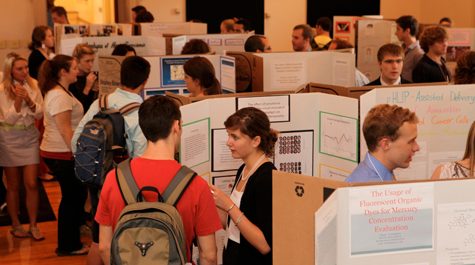Undergraduate research showcased
Andrea Williams ’12 and Dana Hayes ’14 were two of over 60 students displaying their summer research on trifold boards in a tightly packed room on the third day of the Charles Center’s Summer Research Showcase.
Using research funding from the Charles Center, they and over 180 other students had spent their summer conducting research in various subjects ranging from biology to philosophy. The Summer Research Showcase was a week of events to recognize these students for their work.
A freshman Monroe scholar, Hayes analyzed and compared foreign films and recent American adaptations of the same films, focusing the effect of the post-9/11 cultural context. She said her project was inspired by a one-credit internship she took at the College’s Global Film Festival.
Some students, like Williams, conducted their research abroad. Williams spent her summer in England, where she studied letters of King George III during the American Revolution at the British Library.
“We [in America] get the American perspective on the revolution, [but] we never get the British side, and I think there’s this vague perception [that] George III is a tyrant. I wanted to see what he thought about the revolution and see if he was doing things in a tyrannical manner.”
According to Libby Neidenbach, the graduate assistant of Lisa Grimes, the director of fellowships at the Charles Center, students had to submit research proposals in the spring to apply for funding for their summer research. These proposals had to have a clear question, methodology, and sources, as well as the significance of the proposed research.
“The funding is supposed to not only help you with the things you might need to do the project [such as supplies or travel expenses],” Neidenbach explained. “But it’s also so that you can devote 40 hours a week, so you can make it your full-time job over the summer for seven weeks. The financial support should allow you to do that.”
On Monday and Friday of the showcase week, six students each gave 20-minute long presentations about their projects.
Neidenbach reviewed the students interested in presenting orally. She chose oral presenters from a pool of interested students based on their abstracts and a preliminary presentation “to get a good mix and to get good speakers.”
“I’m really always amazed at what the students come up with and how far they go to achieve it,” Neidenbach said.
Poster presentations were on Tuesday, Wednesday and Thursday afternoon.
The students presenting their projects included James Monroe and Murray Scholars. Other students included recipients of competitive grants for international and domestic research, and honors fellows, as well as Chappell Scholars, who worked with faculty members on their research. Upperclassmen had to conduct seven-week projects, while freshmen Monroe Scholars had shorter projects.
According to Grimes, W&M has been leading the way in providing undergraduate students opportunities to conduct research. “Especially for our size,” Grimes added, “we’re pretty much ahead of the curve.”
Neidenbach noted that some students do research for multiple summers, sometimes expanding on their freshman year Monroe project. Meanwhile, seniors like Williams used their summer projects to be stepping stones for their honors theses.
“The showcase gives [honors fellows] an early preliminary deadline to be able to get their thoughts together for that, and then they have the honors colloquium in February, if they want to present to that, so it kind of builds in some good presentation-based deadline as they’re working throughout the year to write their thesis project.”
In addition to being a deadline, Neidenbach said this showcase is “a celebration to highlight undergraduate research that’s going on at the College.”
“We at the Charles Center feel pretty strongly about undergraduate research and getting students involved early on in their academic careers,” Neidenbach said. “Research can certainly teach you a lot of important skills about organizing, critical thinking, and asking questions and finding the answers to them and, presenting is a very important part of the research process. It’s nice to be able to share your work with someone, and it’s also the cherry on top.”

















